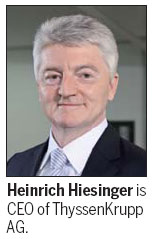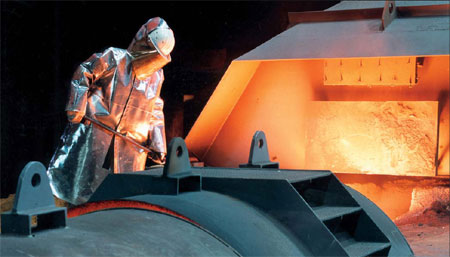Less steel, more savvy
Updated: 2013-02-22 09:43
By Du Juan (China Daily)
|
|||||||||||
|
For at least one company, old ways of doing things in the steel industry are giving way to a more modern approach. Provided to China Daily |

German industrial giant lightens reliance on heavy metal and goes techno
While most steel companies seek to benefit from China's large-scale infrastructure construction projects, one company has decided to capitalize on the country's development by reducing its dependence on steelmaking.
"We are not a steel company," says Heinrich Hiesinger, CEO of ThyssenKrupp AG, an industrial giant with a long history of working in China.
"I want people to consider us as a technology company rather than a steel producer."
Although the company has adopted new ways to expand its businesses in more technological areas, the name ThyssenKrupp is still associated in China with the German arms manufacturer of the 19th century.
However, after developing into a major international steel producer over the past century, the company is now reorganizing itself into a technology-driven group. And China is playing a big role in that transformation.
In October ThyssenKrupp announced it would sell Tailored Blanks, one of its automotive-steel manufacturing units, to Wuhan Iron and Steel Group Co, the fourth largest steel maker in China.
Wuhan Steel was planning to expand by moving from the upstream production of crude steel to the more refined downstream manufacturing sectors to increase its high-end products share.
Tailored Blanks makes lightweight steel sheets for the automotive industry. The company accounts for 40 percent of the global market for such products. Its annual sales in 2011 were 700 million euros, the company says.
"It's a very clear path that we are following, to become a technology-based corporation and an industrial solution provider," Hiesinger told China Daily during its "Ideas Park" innovation and technology event near the company's headquarters in Duesseldorf.
At the event, up to 4,000 ThyssenKrupp engineers demonstrated the company's work in science and technology to visitors.
Asked the reason for his company's transition from heavy to light and less steel, Hiesinger says huge overcapacity in the global steel industry makes it very difficult to be profitable in the business.
"Ten years ago, the steel industry started to see the overcapacity problem, so we changed to the stainless steel business, which brought us profits in the following years. However, the same problem now is happening to the stainless steel industry too, including in the Chinese market."
In late January 2012, ThyssenKrupp announced the sale of Inoxum, the company's stainless steel business, to Outokumpu Oyj, a Finnish stainless steel producer.
The transaction agreement valued Inoxum at about 2.7 billion euros, German media reports said.
"By selling the stainless steel business, we can spare more resources to other sectors with good potential," Hiesinger says. "The investment should go to sectors which can create bigger value. The growth rate, profitability and capital efficiency are three main standards for our business assessment."
ThyssenKrupp is now considering selling its other steel factories in Brazil and the United States, and is in talks with more than 10 companies.
The German company has decided to maintain the scale of its steel business in Europe because it is still profitable, especially in high-end products such as automotive-steel plates.
"Our management philosophy is to produce lower quantities with higher profits," Hiesinger says. However, he adds, that does not work in China because manufacturers are not keen on paying top prices for high-quality steel products.
Hiesinger does not mean China is not an important market for the company; just the opposite.
"I have been stressing the importance of China's role for our company since I became the CEO of ThyssenKrupp in early 2011. I require that every business section's performance rating in China should be higher than the average growth rate of their competitors in the country, because I value the Chinese market a lot."
At present, about 5 percent of the company's revenue comes from the Chinese market. Hiesinger said the figure will grow to about 10 percent after the company's portfolio optimization.
China's economic slowdown and the reduced demand for steel from infrastructure and construction projects since 2011 have greatly affected the domestic steel industry, but not ThyssenKrupp, as crude steel is not its major business in the country.
"All the businesses we are running in China fit the local market well, but we are not satisfied with that," Hiesinger says. "We will keep expanding our businesses in China."
"ThyssenKrupp is going to invest more in emerging markets such as India and China, and meanwhile reduce investment scale in Germany."
The company is setting up five new projects in China: an engine components factory in Nanjing, Jiangsu province; an elevator factory in Guangdong province; separate camshaft and dampener projects in Shanghai; and a mechanical spring company in Chengdu, Sichuan province.
"Some people in Europe think in a pessimistic way about China's economy, but I believe the huge market with a GDP growth rate of at least 7 percent will develop well," Hiesinger says.
The economic slowdown in China will not change plans for the new projects, he says.
dujuan@chinadaily.com.cn
(China Daily 02/22/2013 page13)
Today's Top News
List of approved GM food clarified
ID checks for express deliveries in Guangdong
Govt to expand elderly care
University asks freshmen to sign suicide disclaimer
Tibet gears up for new climbing season
Media asked to promote Sino-Indian ties
Shots fired at Washington Navy Yard
Minimum growth rate set at 7%
Hot Topics
Lunar probe , China growth forecasts, Emission rules get tougher, China seen through 'colored lens', International board,
Editor's Picks

|

|

|

|

|

|






